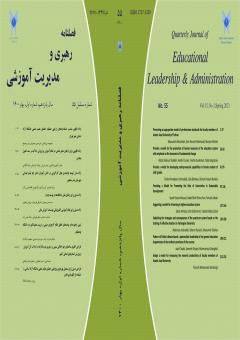Identifying the dimensions and components of empowerment in the development of professional competencies and ethics
Subject Areas :Tahereh Rahimi 1 , Mojtaba Moazzami 2 , Hossein Ali Jahed 3
1 - Department of Educational Management. Kish International Branch. Islamic Azad University, Kish Island, Iran
2 - Assistant Professor, Department of Higher Education Management, Faculty of Management, North Tehran Branch, Islamic Azad University, Tehran, Iran
3 - Associate Professor, Department of Educational Management, Tehran West Branch, Islamic Azad University, Tehran, Iran
Keywords: Empowerment, moral competence, professional competence.,
Abstract :
purpose: Nowadays, empowerment is one of the most important topics in organizations and it is inevitable to increase the quality and efficiency of human resources. Therefore, the purpose of this research was to identify and validate the dimensions and components of empowerment in the development of professional and ethical competencies of managers. The purpose of this research was to identify the dimensions and components of empowerment in the development of professional and ethical competencies of managers.
Methods: In terms of design, the research is one of the quantitative researches. that the survey method was used in order to validate the mentioned model. The statistical population included 1500 primary school principals in Tehran. Using Cochran's formula and random cluster sampling method, the number of 306 people was determined as the sample size. In this study, a researcher-made questionnaire was used as a tool. Reliability was calculated using Cronbach's alpha coefficient of 0.870. Data analysis was done using structural equation method using SPSS22 software.
Findings: The results showed that the identified dimensions and components are highly reliable; Therefore, the validity of the components obtained in this research was confirmed. It also showed that all 14 components do not have the same rank and are at different levels in terms of importance, so that the components of management skills and individual characteristics are the most important, followed by the leadership component, but the decision-making components Organizational factors, business competence, entrepreneurial competence and cooperation have the least importance.
Conclusion: It can be said that the planners of the education system can use the results of this research to develop teachers' professional and moral competencies in order to increase their skills.
آسترکی، سمانه، مهرداد، حسین، قبادیان، مسلم. (1401). شناسایی مولفه¬های مدل شایستگی¬های حرفه¬ای مدیران آموزشی (مورد مطالعه: دوره متوسطه دوم استان لرستان). فصلنامه رهبری و مدیریت آموزشی، 16(2): 134-109.
احسانی افراکتی، سمیرا؛ ضامنی، فرشیدهو صالحی، محمد. (1397). ارائه مدل شایستگی اخلاقی با رویکرد اسلامی در دانشگاه¬هاي آزاد استان مازندران، پژوهش در نظام¬هاي آموزشی، 12(97): 1258-1235.
پورکریمی، جواد، عزیزی، مهدی، فرزانه، محمد، کردی، الهام. (1394). شایستگیهای حرفهای مدیران گروههای آموزشی دانشگاه تهران: تحلیلی بر شکاف بین وضعیت موجود و مطلوب. فصلنامه نوآوری-های آموزشی، 11(1): 98-77.
تقی¬پور، آذر، قاسمی¬زاد، علیرضا و معتمد، حمیدرضا. (1401). شناسایی شایستگیهای حرفهای مدیران آموزشی مدارس متوسطه استان بوشهر، پژوهشهای مدیریت منابع انسانی، 14(3): 281-255.
جعفری¬راد، علی، زاهدبابلان، عادل، مرادی، مسعود و ثمری، عیسی. (1398). طراحی الگوی مفهومی توسعه¬ی شایستگی مدیران مدارس متوسطه، نظریه¬ای داده بنیاد، فصلنامه¬ مطالعات توسعه¬ی اجتماعی- فرهنگی، 7(4): 188-163.
رمضان¬پناه، ندا، علامه، سيدمحسن، سماواتيان، حسين و قانع¬نيا، مريم. (1398). طراحي الگوي توسعه شايستگي¬هاي مديران عالي و مياني شركت ملي صنايع پتروشيمي ايران، فصلنامه علمي- پژوهشي مديريت منابع انساني در صنعت نفت، 11(44): 94-65.
شریعتی، مسعود، ولیپور، مهدی و نوبخت، امید. (1395). طراحی مدل توانمندسازی کارکنان سازمان فرهنگی (مورد مطالعه سازمان عقیدتی سیاسی ناجا)، فصلنامه بصیرت و تربیت اسلامی، 13(38): 96-75.
صادقیان قراقیه، سعید، رسولی، رضا، طبرسا، غلامعلی و قربانی، علی. (1399). طراحی مدل توانمندسازی سازمانی بر مبنای حکمرانی خوب: رویکرد کیفی، پژوهش در نظام¬های آموزشی، 14(99): 52-37.
قموشی، زهرا، پورکریمی، جواد، عزتی، میترا. (1398). شایستگی اخلاقی مدیران دانشگاهی: مفاهیم، مؤلفه¬ها و اولویت¬بندی، فصلنامه توسعه مدیریت منابع انسانی و پشتیبانی، 14(45): 134-106.
Canole, M. & Young, M. (2013). Standards for educational leaders: An analysis. Washington, DC.
Fanelli, S., Lanza, G., Enna, C. & Zangrandi, A. (2019). Managerial competences in public organisations: the healthcare professionals’ perspective. BMC Health Services Research, 20(30), 22-40
Jacobs, R.M. (2018). Developing Ethical Competence: Some Considerations Regarding Virtue, Deliberation, Intention, and Guilt. Public Integrity, 1-13.
Pohling, R., Bzdok, D., Eigenstetter, M., Stumpf, S. & Strobel, A. (2016). What is Ethical Competence? The Role of Empathy, Personal Values, and the Five- Factor Model of Personality in Ethical Decision-Making. Journal of usiness Ethics, 1-26.
Shek, D.T.L. & Zhu, X. (2019). Reciprocal Relationships Between Moral Competence and Externalizing Behavior in Junior Secondary Students: A Longitudinal Study in Hong Kong. https://doi.org/10.3389/fpsyg. 2019.00528.
Wen, J., Huang, S. & Teo, S. (2023). Effect of empowering leadership on work engagement via psychological empowerment: Moderation of cultural orientation. Journal of Hospitality and Tourism Management, 54(20), 88-97.
Yadav, R., Prakash, C. & Dalal, A. (2023). Empowering leadership and innovative work behavior: Mediating effect of psychological mpowerment, Pakistan Journal of Commerce and Social Sciences (PJCSS), ISSN 2309-8619, Journal Education Society, Pakistan (JESPK), Lahore, 17(1), 1-20.
Young, T. L. (2016). A qualitative phenomenological study of managers to reduce conflict between flight attendants after a merger (Doctoral dissertation, University of Phoenix).


